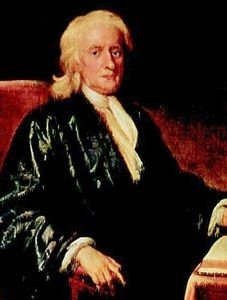
Home - Search - Browse - Alphabetic Index: 0- 1- 2- 3- 4- 5- 6- 7- 8- 9
A- B- C- D- E- F- G- H- I- J- K- L- M- N- O- P- Q- R- S- T- U- V- W- X- Y- Z
Newton, Isaac
 Newton Credit: NASA |
Born: 1642. Died: 1727-01-01.
Isaac Newton created a scientific explanation of the workings of the university that held sway until the twentieth century. Based on the concept of gravity and three laws of motion that related to it, the Newtonian construct placed astronomy and physics on a firm mathematical foundation. Born in England, Newton was educated at Trinity College in Cambridge. As a relatively young man, by 1667 he had developed his ideas on universal gravitation and its consequences, the nature of white light, and the calculus. In the same year he was elected a fellow of Trinity College and two years later succeeded to the chair of his mentor Isaac Barrow. In 1696 Newton was named warden of the Mint and in 1699 he became its master. While still officially associated with Cambridge, his work at the mint effectively ended Newton's academic career.
Country: UK. Bibliography: 535, 5831.
1727 January 1 - .
- Death of Isaac Newton. - . Related Persons: Newton. British scientist, single-handedly developed the principles and mathematical basis of physics. His work established the calculations necessary for celestial mechanics, the rocket engine, and other essential elements of space exploration..
Back to top of page
Home - Search - Browse - Alphabetic Index: 0- 1- 2- 3- 4- 5- 6- 7- 8- 9
A- B- C- D- E- F- G- H- I- J- K- L- M- N- O- P- Q- R- S- T- U- V- W- X- Y- Z
© 1997-2019 Mark Wade - Contact
© / Conditions for Use